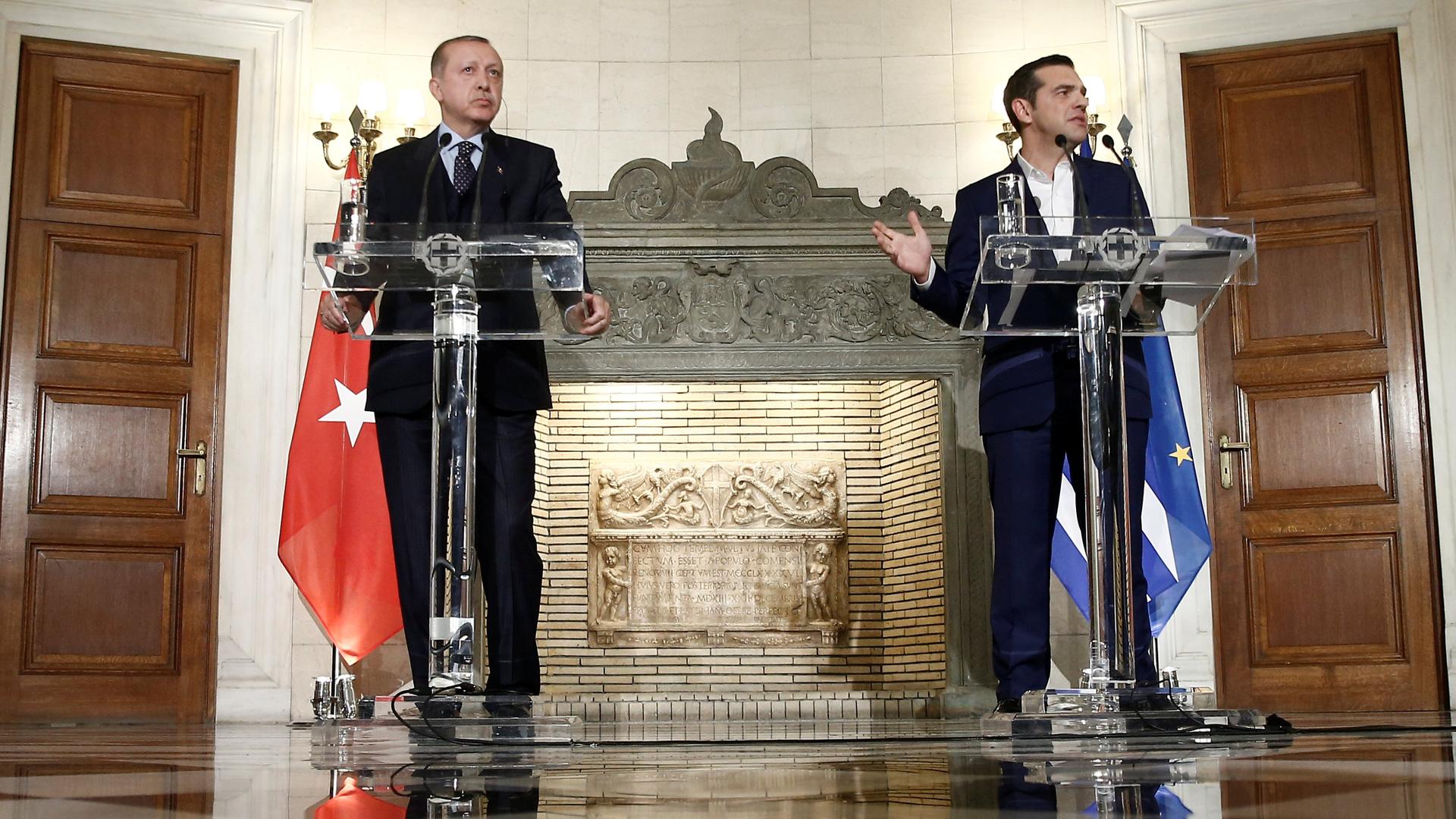Greece and Turkey on Thursday agreed to work on confidence-boosting measures after a landmark two-day state visit to Athens by Turkish President Recep Tayyip Erdogan.
Erdogan, making the first visit to Greece by a Turkish head of state in 65 years, first met with President Prokopis Pavlopoulos where he discussed Greece’s treatment of its Turkish-Muslim minority, an “update” to the Treaty of Lausanne, and the extradition of 2016 coup plotters.
Erdogan also accused the European Union of ignoring promises of financial support given last year in return for Turkey’s help in stemming refugee flows to Europe.
TRT World’s Andrew Hopkins has the details from Athens.
Pavlopoulos, one of the country’s foremost law experts, said Athens had no intention of revising the 1923 Treaty of Lausanne, Turkey’s founding charter.
“This treaty is non-negotiable for us … it requires no revision nor update,” he said.
Separately, in a news conference with Prime Minister Alexis Tsipras the issue of minorities in Greece was again brought up by the Turkish leader.
Contrary to the treaty, Athens appoints religious jurists known as muftis, instead of allowing the local community to do so, Erdogan said.
“Muslims in [Greece’s] Western Thrace have not even been allowed to choose their own mufti from their community; efforts to appoint a mufti are ongoing, but this is not the case for the Patriarchate in Turkey,” he said.
“You cannot find any discrimination against Turkish citizens of Greek origin in Turkey. However, in the Western Thrace, even writing the word ‘Turkish’ is not allowed.”
Erdogan, who visited Greece twice as prime minister in 2004 and 2010, will travel privately Friday to the northeastern region of Thrace where the Muslim minority lives.
Tsipras countered by urging Erdogan to speed up social reforms in Turkey, where many are people have been detained over links to last year’s failed coup.
“I invite you to open a new chapter in Greek-Turkish relations,” Tsipras said.
The press conference highlighted a willingness of the two countries to co-operate despite the lingering issues.
‘Delayed justice’
A more recent bone of contention is Greece’s refusal so far to extradite eight Turkish officers who fled to its territory last year after allegedly participating in the failed coup against Erdogan.
The Greek Supreme Court has blocked the extradition of the officers, and Erdogan lamented that taking the legal route “takes longer.”
“Terrorists, when they are detained in Greece, they should be extradited to Turkey,” he said. “Delayed justice is no justice.”Tsipras said the Greek state had to respect judicial rulings and promised that the suspects would receive a fair trial.
Turkey accuses Fetullah Terrorist Organisation or FETO, lead by Fetullah Gulen, who has been living in a self-imposed exile in the US since 1999, of orchestrating July 15, 2016 coup attempt which left 249 people dead and more than 2,000 injured.
Ankara also accuses FETO of being behind a long-running campaign to overthrow the state through the infiltration of Turkish institutions, particularly the military, police, and judiciary.
Pragmatic relationship
Tsipras appeared to try to smooth over any tensions ahead of the visit, telling Turkey’s Anadolu news agency that suspected coup plotters “were not welcome” in Greece and emphasised the importance of dialogue between Turkey and the EU.
Erdogan has sought a more pragmatic relationship based on trade and tourism, and Greece became a key backer of the Turkish bid to join the EU.
Issue of Cyprus
Touching on the divided island of Cyprus, “Our aim is that we shall find a permanent and fair solution on Cyprus, and find the same in the Aegean,” Erdogan said.
Turkey blamed Greek-Cypriot intransigence after the latest peace initiative in Switzerland under the auspices of guarantor countries Turkey, Greece, and United Kingdom collapsed this July.
Greek-Cypriot voters also rejected the Annan peace plan that was brokered by the UN in a 2004 referendum. It was approved by Turkish-Cypriot voters.
The Eastern Mediterranean island has been divided since 1974, when a Greek-Cypriot coup was followed by violence against the island’s Turks, and Ankara’s intervention as a guarantor power to set the peace.
The Turkish Republic of Northern Cyprus was declared on November 15, 1983.
Much-touted peace talks this year to reunify the island ended without a breakthrough.










Discussion about this post